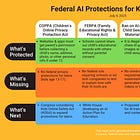Protecting Your Child’s Data: A Parent’s Guide to US Privacy Laws
Breaking down federal privacy laws so you can protect your child online
Read a newer version (July 2025) where I breakdown in detail US Federal and State Regulations related to AI.
Are you sure you know who’s tracking your child online?
With AI and Tech everywhere, understanding privacy laws is more important than ever for parents like us. There are not only Federal laws but also varying State and Local laws that covers these issues, which can be complicated to follow. Here I’ve created a simple infographics on the Federal Privacy Laws and breakdown further on what these laws mean to you as parents.
US Kids’ Privacy Laws: What Every Parent Needs to Know
Let’s start with the basics…
COPPA (Children’s Online Privacy Protection Act)
Applies to children under 13.
Requires websites and apps to get verifiable parental consent before collecting, using, or sharing your child’s personal information.
Recent update (like the proposed COPPA 2.0) means companies must get separate opt-in consent for things like targeted ads, and can’t keep your child’s data longer than necessary.
“Personal information” now includes things like biometric data (face scans, fingerprints) and government-issued IDs.
FERPA (Family Educational Rights and Privacy Act)
Protects student education records at schools that receive federal funding.
Gives parents the right to access, review, and request corrections to their child’s school records.
Limits who outside the school can see your child’s information without your consent.
What Does This Mean For Your Family and AI?
More Parental Control: You must give clear consent for your child’s data to be collected or used for advertising. You can also ask companies to delete your child’s data.
AI & Ed Tech: AI-powered apps and learning tools in schools must follow these rules, but there’s still a gray area, especially as AI gets smarter and collects more types of data.
Teens & Social Media: New proposals (like KOSA) aim to expand protections up to age 16 or 17, banning targeted ads and requiring stronger parental controls on social platforms.
Varying State/Local Laws: Some states have even stricter rules-especially around biometric data and targeted ads to minors. Stay tuned for our next article for a deeper dive.
What Should Parents Do?
Always check privacy settings on your child’s apps and devices.
Talk to your kids about what they share online.
Use parental controls, but be aware: as kids get older, they may gain more rights to control their own data.
If you’re unsure, ask your child’s school or the company how they use and protect your child’s information. You are protected by law to know!
Stay updated. Laws are changing too. I’ll update this article as proposed regulations, like COPPA 2.0 and KOSA (Kids Online Safety Act), gets through the legal system.
Stay Tuned!
This is the first in our series on privacy laws for families. Next up: state/local rules and international protections (UK, Australia, Singapore, and more).
Thanks for joining me in this journey. Let’s protect our child’s digital future. One click at a time.
Dhani
---
*P.S. If you found this helpful, consider sharing aiPTO with another parent navigating these same waters. Let’s tackle this together!




